We are living in the 21st century where getting the next best thing on our resume is never out of our mental to-do lists. Everyday we wake up, go through our day, sleep and repeat. The brain is just so stuffed all the time. We overestimate the capacity of our brain to hold things in it. When sometime you were giving an exam, had it ever occurred that you just couldn't recall an answer at all, but as soon as you had submitted the answer-sheet the response just came flooding back as if it was always there staring at you, and laughing. It was because you were so stressed and the brain didn't like that so it focused on calming the body instead of recalling an answer. Similarly, when we are just so focused on giving our best, the brain cannot find energy to confirm whether or not to acknowledge if something you did was good enough.
The war of doubt and confusion of if you deserve what you have in the first place with the feeling of you being an imposter even with all your accomplishments or attempts is quite common with the goal-oriented mindset of the current times. This psychological condition is termed as imposter syndrome or perceived fraudulence. There is no problem with occasional self-doubt since it leads to self-reflection but to chronically think as if wherever you are is just 'cause an angel dropped you cannot be a benefactor.
There can be many reasons behind this:
- Stress-It can make you feel as if you are doing work fast so you are not doing it well enough.
- Social Media-It stimulates the urge to be appreciated which if doesn't happen can fuel the feeling of not being good.
- Existential Crisis-When a major turn in life occurs i.e. a new phase in life begins we can feel different and undeserving.
- Reaching a High Position-Achieving many things can lead to the doubt that did you work enough or is it all fate and will be snatched soon.
- Peer Pressure-Nowadays having mental disturbances like OCD, clinical perfectionism, etc, have been highly romanticized and simplified in society. People are saying these things are easy to handle-although this can help in feeling normal but it often magnifies scenarios where there is no actual problem with one person but the person who actually has it can be left in shadows. It makes a perfectly fine person become self-doubting just as some people consider it to be 'Cool' or make a suffering person scared to confront their problems.
- Over-thinking-It can make you over-analyze your personality to the level where you can't confirm if you are good at things you were a master at.
The main thing you can do to tackle it is understanding that almost everyone goes through this at least once in their life no matter what their age and that it's okay to feel as if you don't belong, time will calm the storm just as if it was never there. Other things which can help are:
- Talking to someone about your self-questioning habits.
- Going for Therapy/Counselling.
- Journaling/Self-reflection.
- Giving yourself a break.
- Reminding yourself about the process behind all your achievements.
- Trying to find the reason behind the problems and working on it rather than the issue.
"Everything becomes so precious when your end is probably the next second."
-Anne Frank



Idk how to praise this🤩
ReplyDeleteThank you ☺️
DeleteThought provoking!
ReplyDeleteThank You :)
DeleteSuperb 👍
ReplyDeleteThank you so much!
DeleteNice
ReplyDelete